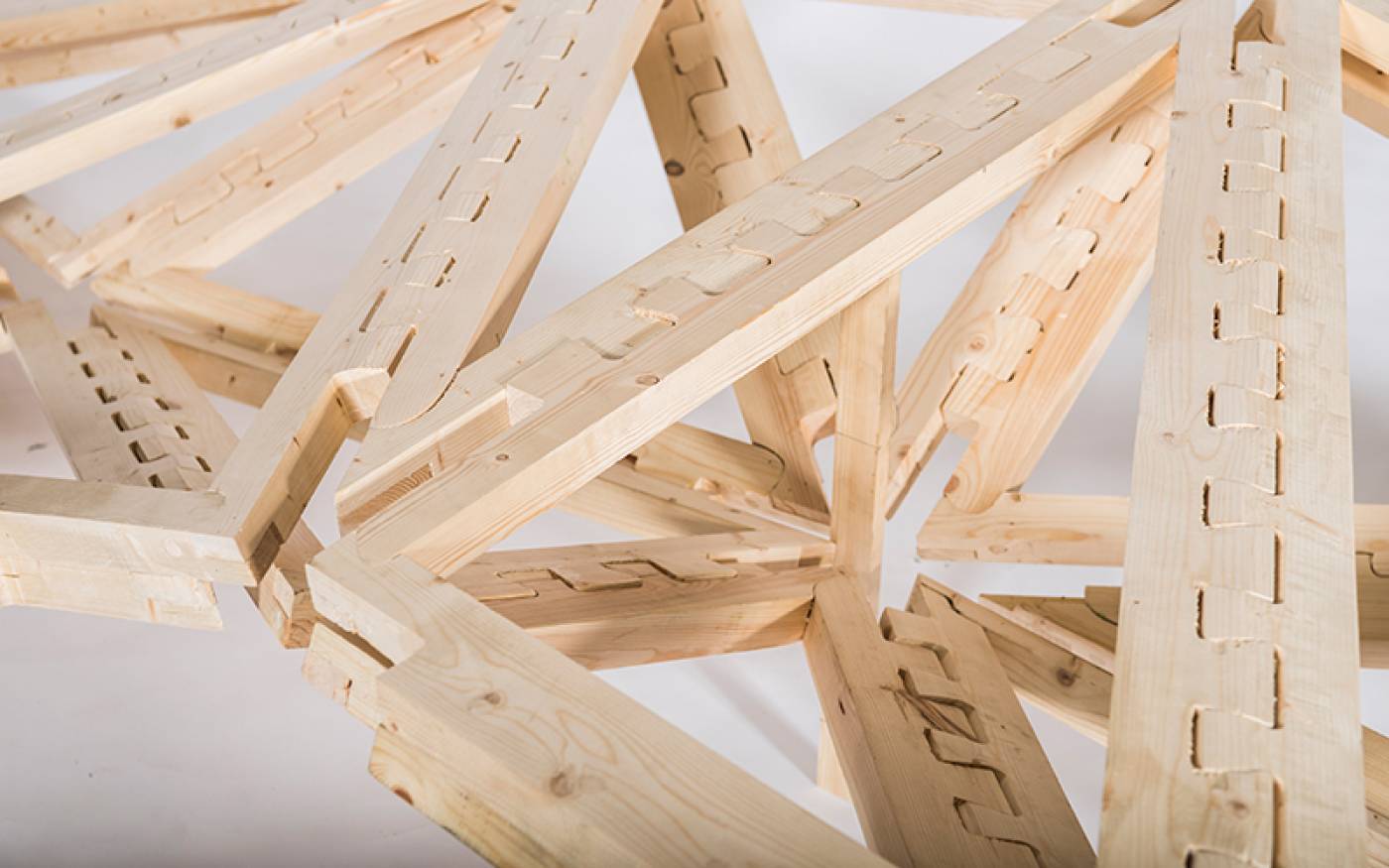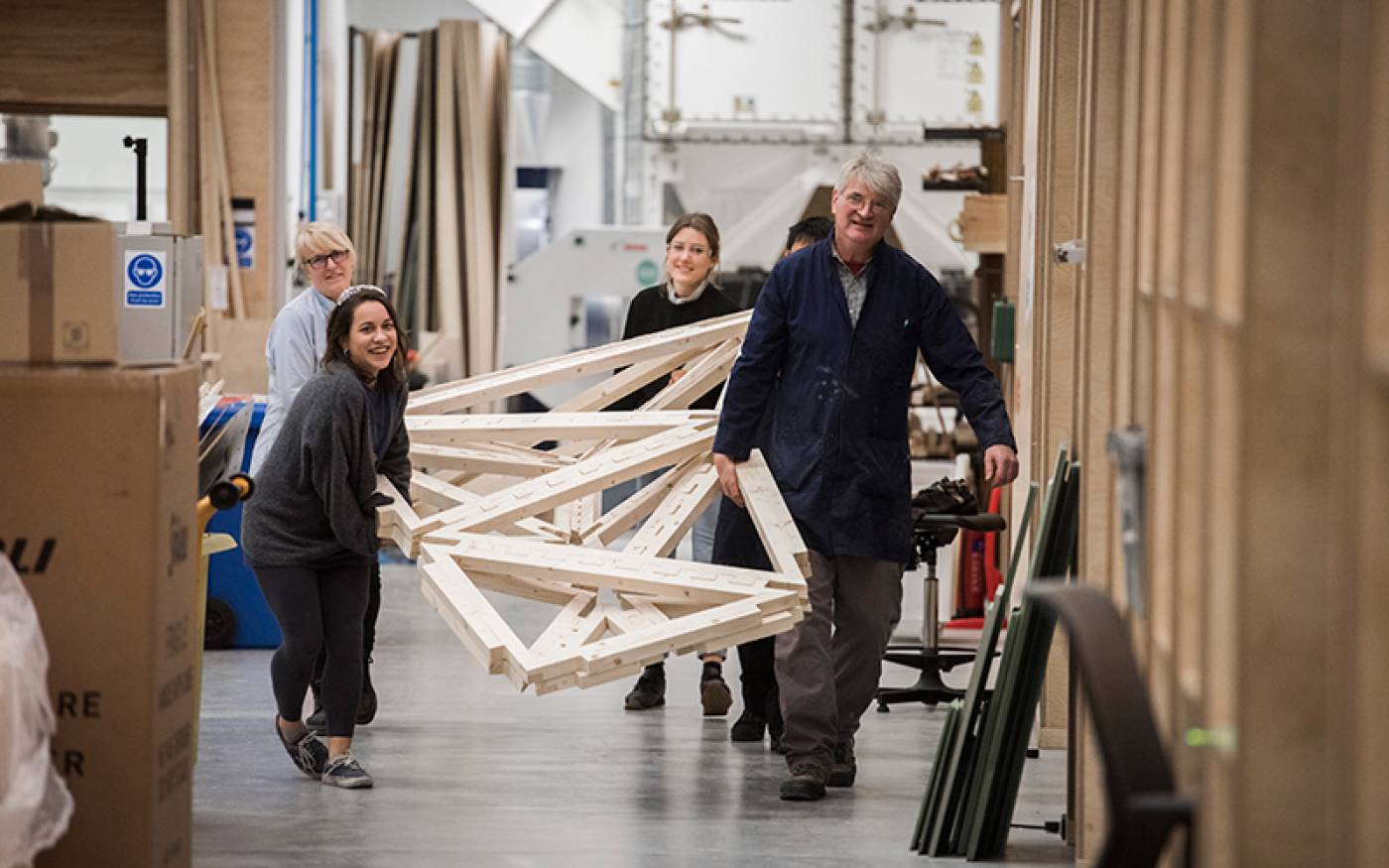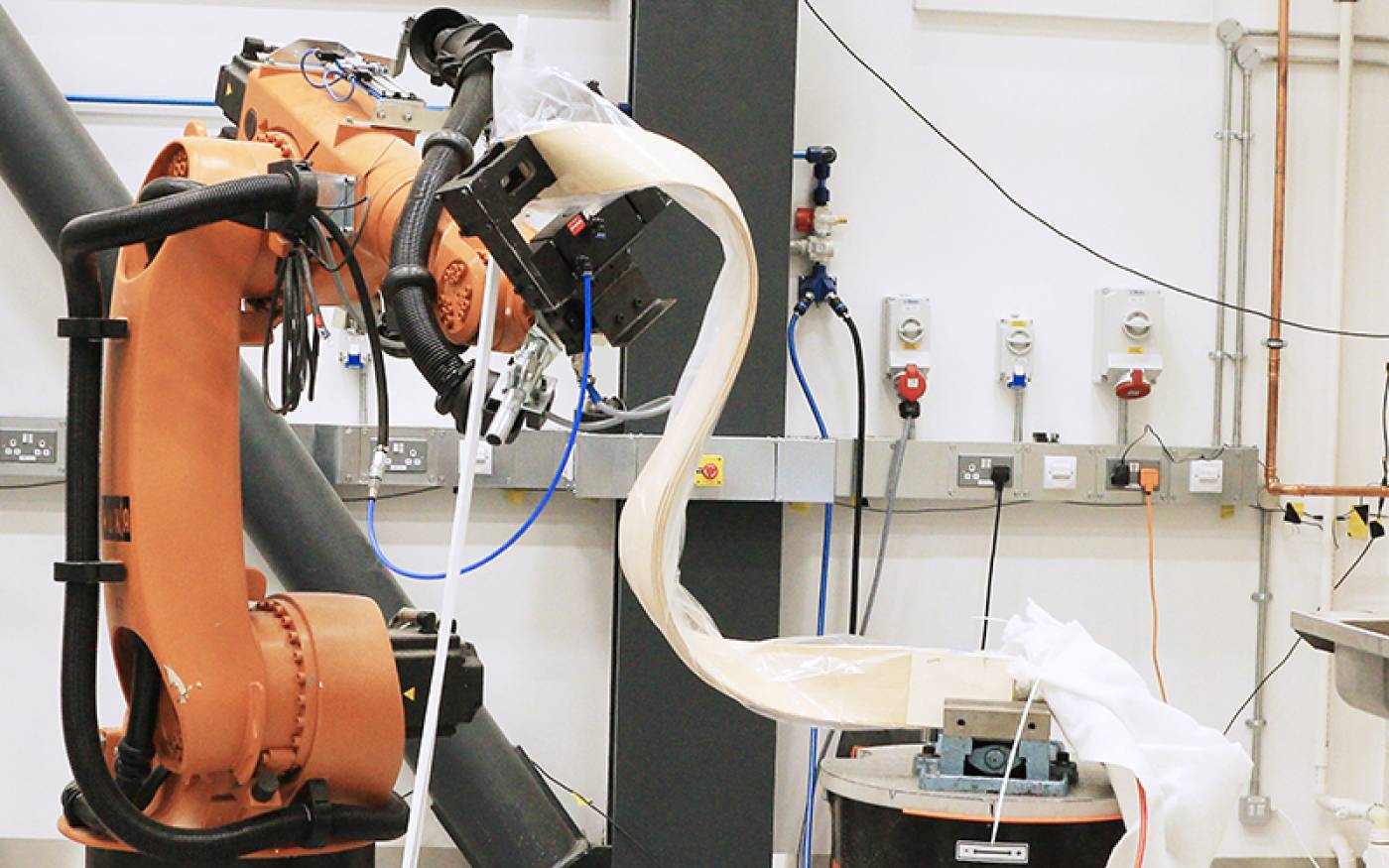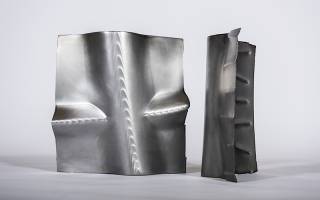This programme teaches students how to place their design skills in the context of fast-evolving developments in construction, fabrication, assembly and automation.



Register: Here East Architecture Open Day on 24 April 2024
About
Taught over 15 months, Design for Manufacture prepares a new professional workforce of skilled, creative and adaptable experts, with tacit and explicit knowledge of design, engineering, material behaviour, analogue and digital craft, and advanced systems operations.
There is an abundance of advanced design and engineering tools in the UK that an elite workforce develops and deploys to export their expertise worldwide. Yet there is currently a shortage of skilled workers at the point of production tasked with delivering increasingly sophisticated and challenging projects by clients, in line with rising expectations of quality and regulation.
This programme will expose students to new forms of advanced design and engineering methods – such as robotics and 3D scanning – that are currently reinventing core approaches to shaping, making and refitting the built and manufactured environment. Working in state-of-the-art facilities at Here East, Queen Elizabeth Olympic Park, students develop their own practice with multi-disciplinary academics, designers and practitioners.
Highlights
- Develop, learn and innovate with advanced manufacturing processes, including robotics for fabrication and assembly, 3D printing, CNC milling, water jet, 3D scanning and laser cutting
- Have access to large-volume space for 1:1 prototyping at Here East in close proximity to complimentary disciplines and expertise in civil engineering, computer science, architectural computation, environmental design and performance design
- Work collaboratively to design and prototype elements, such as furniture systems, structures and enclosures, set within the context of contemporary challenges such as sustainability, production, cost, and assembly
- Work with B-made – The Bartlett Manufacturing and Design Exchange – our state-of-the-art fabrication workshop staffed by experts in craft, making, manufacturing and robotics.
Modules
- Introductory Design Workshops (15 credits)
Module coordinators: Barbara Zandavali
Students participate in project-specific workshops that leverage the skills acquired during the above module. Students take three workshops in groups and prepare a portfolio compiling the results from each, aided by tutors who are professional researchers and practitioners. Students are expected to contextualize their projects based on the lectures and texts taught and to apply the skills learned in the concomitant modules from Term 1 (Skills and Contextual Theory).
- Skills Portfolio (30 credits)
Module coordinator: Donat Fatet
Students are taught skills that are applicable to the whole programme, such as 3D modelling (solid modelling, surface modelling), analog making, CAD/CAM (e.g., CNC machining), parametric design and programming (e.g. Grasshopper 3D). Many of these skills are digital-based, whilst others are analogue. Students gain familiarity with the workshop and taught the principles of ‘design-through-making’, such as the properties of materials and composites including behaviour within the manufacturing process and during assembly, the difference between the drawn and the made, and the flow of information between both.
- Design Thesis Portfolio: Initial Projects (30 credits)
Module coordinator: Arthur Prior
Students gain an understanding of the processes of designing through making and digital simulation, as well the design, manufacture and production of well-considered components and assemblies. Students work in groups to create an initial set of propositions based on a design topic of their choice (for example, the design of timber assemblies for robotic fabrication or the manufacture of components for a mechanism). They present their project through a portfolio of drawings and simulations which check structural and environmental performance. The work carried out in this module inspires their future projects throughout the rest of the programme.
- Contextual Theory: Design for Manufacture (15 credits)
Module coordinator: Clara Jaschke
This module introduces students to the various theoretical and practical positions in relation to the subject of Design for Manufacture. They are exposed to state-of-the-art literature and key projects within the field. The module is delivered through seminars and readings. Students write an essay in their chosen topic of interest, supported by experts in academic writing.
- Design Thesis Portfolio: Final Project (60 credits)
Module coordinators: Peter Scully
The outcome of the "Initial Projects" module (BAR0059) forms the basis of the “Final Projects”, which will continue throughout the course until final submission at the end of the year. As the title suggests, it is the programme’s main body of work and involves the execution of an in-depth research project, culminating in the delivery if a significant final prototype. Results are compiled in the form of a physical prototype and showcased as part of the annual Fifteen Exhibition.
- Design Thesis: Written Report (30 credits)
Module coordinator: Clara Jaschke
In this module, students examine a key research question that has arisen from their preliminary design, which will inform their final project. Thesis tutors work closely with the design thesis tutors to provide students with support. Students write up their theses over the summer with ongoing tutorials. At the beginning of Term 4, students’ hand in their submissions and there is a conference where they present a summary of their report to staff and incoming students.
Key information
Modes/duration
Full-time: 15 months, beginning in October
Part-time: 30 months
Flexible: two to five years
Entry requirements
A minimum of a second-class UK degree in an appropriate subject or an overseas qualification of an equivalent standard. Applicants with extensive experience in the field may also be considered.
A design/creative portfolio is also expected. Applicants will be asked to submit a portfolio of their design work once their completed application has been received, and should not send or upload work until it has been requested.
- Read the full entry requirements on the UCL Graduate Prospectus
- Read the full guidance on portfolio preparation
Application guidance for 2024 entry
Applicants can only apply for a maximum of two postgraduate degree programmes at The Bartlett School of Architecture.
Application deadline
Applications for 2024 entry will open on 16 October 2023 and close on 5 April 2024 (for applicants requiring a visa) and 30 August 2024 (for applicants not requiring a visa). We strongly advise early application, as our programmes are over subscribed and competition is high.
Deferral
It is not possible to defer an offer at The Bartlett School of Architecture. If you wish to be considered for the following year then you must reapply in the next admissions cycle.
Tier 4 Student visa holders
Tier 4 Student visa holders are required to meet the English language proficiency of their offer no later than Friday 24 June 2022, in order to allow sufficient time to obtain a CAS number and visa.
Accepting your offer
To accept your offer, you must pay the non-refundable fee deposit of £2,000 and decline any other offers for programmes at The Bartlett School of Architecture. If you do not respond within the given time indicated on your UCL offer letter, then your offer will be withdrawn.
Fees and funding
- Tuition fee information can be found on the UCL Graduate Prospectus
- Please note, if you are planning to fund your studies with a Postgraduate Master's Loan, the instalments and the UCL fee payment deadlines do not align due to the duration of this programme. You will need to personally fund any shortfall until the remainder of your loan is paid to you.
- For a comprehensive list of the funding opportunities available at UCL, including funding relevant to your nationality, please visit the Scholarships and Funding section of the UCL website.
Staff
This programme draws upon the related and internationally recognised expertise within The Bartlett Faculty of the Built Environment and The School of Architecture, as well as across UCL, including the Civil Engineering and Computer Science departments of UCL Engineering. The programme is also supported by B-made, The Bartlett Manufacturing and Design Exchange.
- Peter Scully, Programme Director
Peter Scully is Program Director for DfM, Director of the Bartlett Manufacturing and Design Exchange (BMADE) and chair of the Technical Management Group UCL. He has been working within custom manufacturing solutions for 25 years, pushing a holistic agenda for design through purposing the interfaces between key players in production. As a researcher, he has worked with built environment professionals, the aerospace industry, and environmental & socially orientated groups to further the delivery of design responsibilities within a contemporary context. His industrial experience in directing high threshold design for delivery in commercially coordinated work has delivered 100’s of artistic and architectural projects for public and private realms. He is currently working within the healthcare sector to deliver user centric design solutions for the NHS in Ophthalmology.
- Arthur Prior, Lecturer
Arthur Prior has held research and development positions in industry and academia since 2013. His research focuses on industrial applications of digital manufacturing; his areas of expertise include hybrid manufacturing, robotics, processing complex fluids and rheology. He has a track-record of spinning-out and scaling-up patented technologies, having successfully taken research from proof-of-concept stage to commercialisation, resulting in widespread adoption in the automotive industry by companies such as Staedtler GmbH, Tartler GmbH, SM Klebetechnik GmbH, Audi AG, Kolb Design Technology, WASP S.r.l and Honda Motor Company, Ltd. Arthur received the prestigious Marie Sklodowska-Curie Early Stage Researcher fellowship for his PhD at University College London as part of the InnoChain European Training Network. Prior to that, he worked on a number of high-profile projects in the contemporary art and cultural heritage sectors for the Marid-based company, Factum Arte.
- Clara Jaschke, Lecturer (Teaching)
Clara Jaschke has worked in architectural practice and academia since 2012. She has a diverse background across both areas, with her research interests ranging from the application of new technologies towards streamlining the virtual-physical interface in architectural production, to potentials of blockchain for design democratisation and historical explorations. Before graduating from the MRes Architecture & Digital programme at the BSA with distinction in 2018, Clara completed her BSc and MSc in Architecture at the University of Innsbruck, Austria, with a focus on computational design and architectural engineering. She is the founder of ‘Alphabet Architecture’, a service specialising in translations of architectural texts. In this capacity, Clara also developed ‘Building Statements’, a post-professional curriculum for supporting architects in strengthening their professional English skills. She has been teaching across a range of programmes at the BSA since 2018, and is currently the Theory Coordinator for Design for Manufacture, and the Departmental Tutor for MEng Engineering and Architectural Design, Years3&4.
- Barbara Zandavali, Lecturer (Teaching)
Barbara Zandavali is an architect, computational designer and lecturer at MArch Design for Manufacture and MEng Engineering and Architectural Design at the Bartlett. Her expertise and research interest encompass digital fabrication, simulation and modelling for integrative design. She holds a in Architecture at Federal University of Parana, a MSc in Modelling and Simulation for the Built Environment.at University of Rio Grande do Sul and a MRes in Architectural Computation at the Bartlett, University College London. She has taught as a design tutor in postgraduate studios at University of East London where she was responsible for overseeing the the digital fabrication lab as well as a senior robotics technician. Prior to teaching, her past experiences focused on sustainability consultancy for large scale projects and as a designer at the RIBA International award-winning architecture firm Aleph Zero.
- Ben Spong, Lecturer (Teaching)
Ben Spong is a practising Architect and Lecturer (teaching) at The Bartlett School of Architecture. He teaches on the Design for Manufacture programme as well as within B-made. His research practice lies at the intersection of digital fabrication and representation, exploring the speculative potential of one to produce realities grounded within, or by the other. He has worked on several award-winning projects and continues to collaborate with architecture practices and the wider construction industry. Before proceeding to complete his master’s degree with distinction at the Bartlett and his Part 3 Professional Practice at the Architectural Association, Ben studied architecture at the University of Brighton where his work was nominated for the RIBA President’s Medal.
- Donat Fatet, Senior Technician
Donat Fatet is a woodworker and materials scientist. He helps run the Bartlett’s B-made workshop in Gordon Street with an emphasis on digital fabrication using subtractive methods (CNC routing, laser cutting…). He also coordinates the teaching on the Skills module which runs in the first term and provides students with the tools to study design for manufacture effectively.
- Nikoletta Karastathi, Theory Coordinator
Nikoletta Karastathi is an architect, PhD Candidate and Lecturer at Design for Manufacture at The Bartlett. She has a diverse background; working in the industry as a practising architect and in academia. As a practising architect, she has worked for eight years in award-winning practices in Newcastle (Napper Architects) and London (Chapman and Taylor) at one of the top 25 AJ practices. In parallel, she has taught as a design tutor in undergraduate and postgraduate studios at Bristol, Cardiff, Newcastle, and Edinburgh. She is passionate about the benefits and application of research in practice, which she has promoted by leading the Northeast RIBA Research and Innovation Group (2016-2019). She has also been a Jury member for the 2019 RIBA President's Awards Research. Her work has been exhibited at the London Design Festival, Dutch Design Week, Lakeside Arts Gallery and the Baltic Centre of Contemporary Arts. Her interests lie in architecture, textiles, computation, and material programmability.
- Pradeep Devadass, Lecturer
Pradeep Devadass is an architect and roboteer. He specialises in bridging the gap between architectural design and robotic construction. He currently teaches DFM and Bio-ID at the Bartlett, UCL. He has previously taught at the Architectural Association (UK) and RWTH (Germany). Prior to teaching, he worked with Archi-Union (China) & RSP (India) as an architect. He is one of few recipients to receive the prestigious MAK-Schindler Residency Program Award (USA) awarded to emerging artists and architects, internationally. He has been certified by Knowledge Transfer Partnership (Innovate UK) as a global leader in computational design, construction, innovation and teaching. He has played a key role in developing the Architectural Association School of Architecture's First Robotic Lab. He earned his Master of Architecture degree in Emergent Technologies & Design from the Architectural Association, London in 2013.
- Daniel Rodriguez Garcia, Teaching & Learning Administrator
Daniel Rodriguez is the Teaching and Learning Administrator for MArch Design for Manufacture, MArch Design for Performance & Interaction and MA Situated Practice. He has several years of experience in Education Administration, Student Services and Student Engagement. He has worked with FE and HE institutions across different European countries including Spain, UK, Denmark, Italy and Belgium.
Our staff are very closely linked to several practices and institutions both outside of and across UCL:
- Affiliated practices and institutes
Arup Buro Happold
Foster + Partners
Laing O’Rourke
Price & Myers
ScanLAB Projects
UCL Civil, Environmental and Geomatic Engineering (CEGE)
UCL Institute for Environmental Design and Engineering (IEDE)
Careers
The Bartlett School of Architecture is one of the world's top-ranked architecture schools and our graduates enjoy excellent employment opportunities.
As well as providing students with the skills to develop a successful career in advanced design and manufacture, this programme also enables students to carry out future doctoral research in the field.
Contacts
Programme Director: Peter Scully
Departmental Tutor: Claire McAndrew
Programme admissions enquiries: Complete the contact form
Programme Administrator: Daniel Rodriguez
 Close
Close


